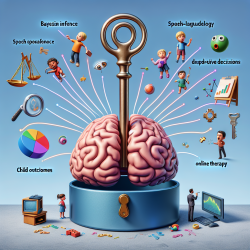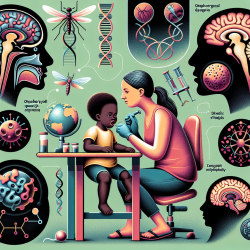Introduction
In the realm of speech-language pathology and mental health, understanding the intricate relationships between various psychological conditions is crucial for developing effective interventions. A recent study titled "Association of ADHD symptoms, depression and suicidal behaviors with anxiety in Chinese medical college students" provides valuable insights into these relationships, particularly focusing on medical students in China. This blog explores the study's findings and discusses their implications for practitioners working with children and young adults.
Key Findings
The study, conducted among 4882 medical college students, revealed a significant prevalence of anxiety (19.9%) and highlighted the comorbidity of anxiety with ADHD symptoms, depression, and suicidal behaviors. Key risk factors for anxiety included smoking, physical disorder history, suicidal ideations, and inattention and hyperactivity symptoms.
Implications for Practitioners
For practitioners, these findings underscore the importance of a comprehensive assessment approach that considers the potential overlap of symptoms across different psychological conditions. Here are some strategies to enhance clinical practice:
- Holistic Assessment: Incorporate assessments that evaluate anxiety, ADHD, and depression symptoms simultaneously. This can help identify comorbid conditions early, allowing for more targeted interventions.
- Family Engagement: Given the study's findings on the impact of familial relationships, practitioners should engage with families to improve parent-child interactions, which may mitigate anxiety symptoms.
- Behavioral Interventions: Implement interventions that address both inattention and hyperactivity, as these were identified as independent risk factors for anxiety. Techniques such as cognitive-behavioral therapy (CBT) can be effective.
- Suicide Prevention: Develop protocols for assessing and addressing suicidal ideations and behaviors, particularly in students with high levels of anxiety and depression.
Encouraging Further Research
The study highlights the need for further research into the neurobiological underpinnings of these comorbid conditions. Practitioners are encouraged to contribute to this growing body of research by exploring:
- The specific neural pathways involved in the comorbidity of ADHD and anxiety.
- The role of cultural and socio-economic factors in the prevalence of these conditions among medical students.
- Longitudinal studies to establish causal relationships between these psychological conditions.
Conclusion
Understanding the complex interplay between ADHD, depression, and anxiety is essential for improving mental health outcomes in medical students. By integrating these findings into practice, practitioners can better support their clients in achieving positive mental health outcomes. To read the original research paper, please follow this link: Association of ADHD symptoms, depression and suicidal behaviors with anxiety in Chinese medical college students.










